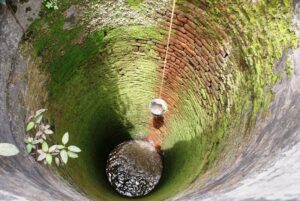Photo Credits: Anil Gulati, Water in well in Purulia, https://www.flickr.com/photos/indiawaterportal/4483255321
In parshat Hukkat, both Miriam and Aaron die, but under very different circumstances. From a p’shat, or “literal” reading of the text, Miriam simply dies and is buried, while Aaron is not only given notice that he will pass away, but is accompanied by his brother Moses and son Elazar, who will assume the position of high priest.
As modern, 21st century individuals, and from a feminist viewpoint, we could chalk this up to the patriarchal, male-dominated text that marginalized women, but I think this would be disrespectful to Miriam. According to our tradition, during Miriam’s lifetime, a well accompanied the Israelites as they journeyed in the wilderness of Sinai, and when she died, the well dried up. The rabbis inferred this from the juxtaposition of Numbers verses 20:1-2, “Miriam died there and was buried there … The community was without water.” Not only is the community bereft of her spiritual presence and prophecy, they are physically bereft as well, and concerned for their very lives and future. Water was – and is – essential to life, and we can argue that Miriam’s presence and guidance was essential to the Israelite community, even if the text didn’t document it.
Aaron, the High Priest, is told by God that he will not enter the Promised Land, but will be yei-aseif amav, “gathered to his people,” a euphemism often in used TaNaKh for dying. The people mourned for 30 days, shloshim. Not only is Aaron given notice that he will die shortly, he is stripped of his priestly garments, which are put on his son, Elazar, signaling the transfer of ritual leadership. It’s one thing to take off a ring, or crown, or coat, and place it on someone else, another to have it taken from you. We can only imagine what Aaron might have been thinking during the time between God’s announcement that he was going to die, and when it actually happened. While Aaron may have merited a mourning period, he died naked. Is this a fitting send-off for the High Priest?
Some people, like Miriam, “drop dead,” and some, like Aaron, have time to prepare. It’s very likely that Miriam’s death was a shock to the people, and the lack of documented mourning was a manifestation of that shock, along with a fear that without her – and the water that accompanied her – life could not go on. Moses and Aaron shared this fear, and we can understand Moses’ chastising the people and striking the rock instead of speaking to it, as an expression of his anguish.
According to the text, God deals harshly with Moses and Aaron because they disobeyed the Divine instruction to speak to the rock. Is it possible that God also had a knee-jerk reaction as a result of grief? If we are created b’tzelem Elohim – in the Divine image – then we and God share qualities, “personality” traits and emotions, which is why God’s attention is turned to the welfare of a grieving people, and they are given abundant water; turning, as the psalmist writes, “You turn my sackcloth of mourning into robes of joy.
May mayim chayim, the “living waters” continue to flow through us and among us, sustaining us.











0 Comments